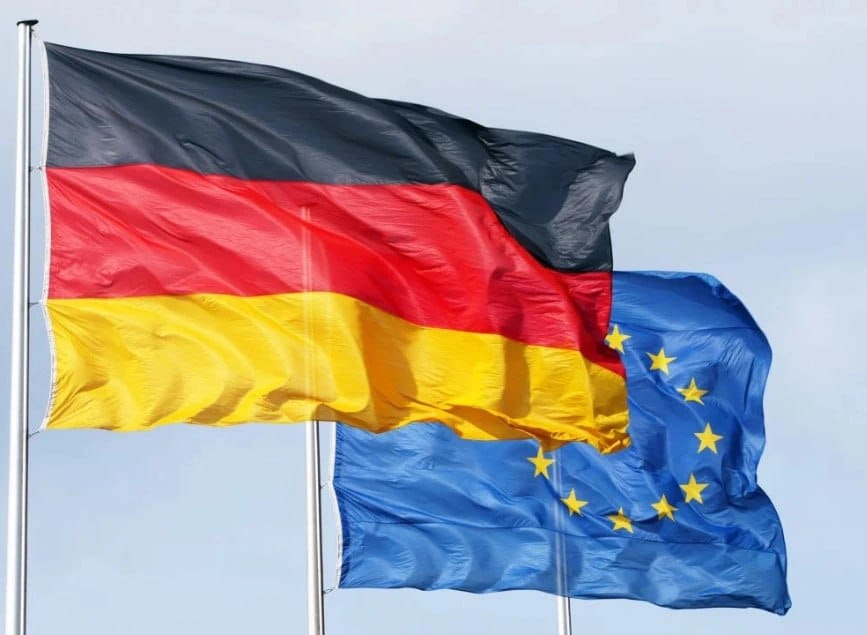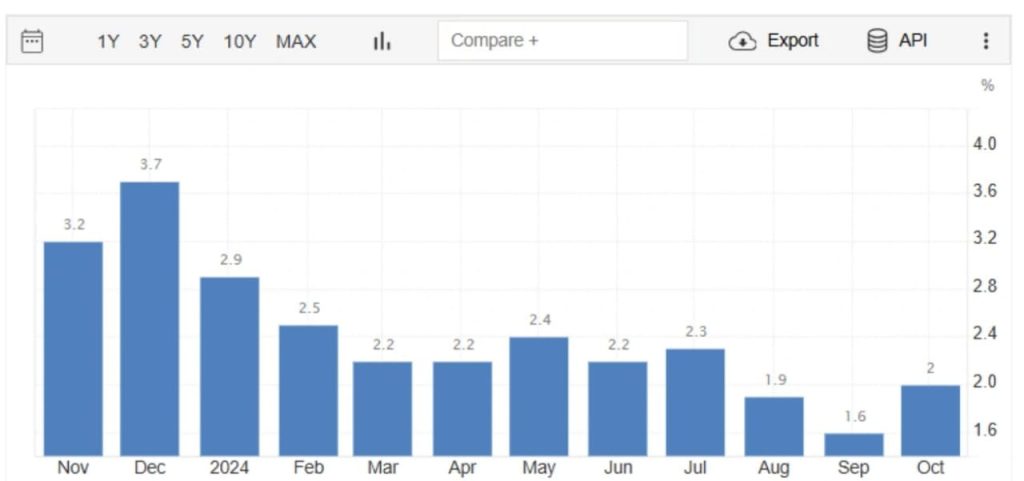
Germany’s Inflation Rate Rises to 2.0% in October 2024
Germany’s annual inflation rate climbed to 2.0% in October 2024, marking an acceleration from the previous month’s low of 1.6%. This increase represents the highest inflation rate in three months, signaling a rebound from the lower inflationary pressures experienced earlier in the year. The uptick in inflation was largely driven by notable increases in services and food prices, which saw more significant gains compared to September.
Services inflation rose by 4.0%, up from 3.8% in September, as demand for various services increased, including housing and healthcare. Similarly, food inflation accelerated to 2.3%, from 1.6% in the previous month, due to rising prices for staple items such as bread, dairy, and meat. This reflects broader global food supply challenges and increasing production costs. Meanwhile, goods prices, which had been declining in recent months, rebounded slightly, rising by 0.4% after a slight contraction of -0.3% in September.

Energy Prices Decline at Slower Pace
On the energy front, the annual decline in energy prices slowed in October. Energy costs fell by 5.5%, compared to a larger decline of 7.6% in September. This deceleration in the pace of energy price reductions can be attributed to smaller drops in heating oil (-13.4% vs. -17.9%) and household energy (-3.2% vs. 4.0%), partly due to base effects. Additionally, while electricity prices fell by 5.5%, and natural gas prices dropped by 0.8%, these declines were less pronounced compared to earlier months. These factors helped prevent further deflationary pressures on the broader economy.
Core Inflation Rises, Reflecting Persistent Price Pressures
Excluding volatile food and energy prices, Germany’s core inflation rose to 2.9% in October, up from 2.7% in September. This increase indicates that underlying inflationary pressures are still strong despite slower declines in energy prices. Core inflation, which is often considered a better gauge of long-term inflation trends, suggests that price increases are widespread across various sectors of the economy, from goods to services.
On a monthly basis, Germany’s Consumer Price Index (CPI) rose by 0.4%, a notable increase compared to the flat reading in September. This signals that inflationary pressures were not only higher year-on-year but also accelerating in the short term.
EU-Harmonised CPI Also Rises, Reflecting Broader Inflation Trends
In addition to the domestic CPI, the EU-harmonised CPI, which adjusts for differences in calculation methods across European Union countries, also rose sharply in October. The EU-harmonised inflation rate for Germany surged to 2.4%, up from 1.8% in September. On a month-to-month basis, the index increased by 0.4%, indicating that inflationary pressures are not limited to Germany but are also impacting the broader EU region.
Outlook for Inflation and the Economy
The acceleration of Germany’s inflation in October highlights ongoing challenges for both consumers and businesses. The rising costs of services, food, and other essential goods will continue to strain household budgets, while businesses may face higher input costs that could impact profitability. The persistent rise in core inflation suggests that price pressures are broad-based, which may keep inflation above the European Central Bank’s (ECB) target for some time.
Looking ahead, the impact of these inflationary trends will depend largely on how both the ECB and German policymakers respond. While energy prices have seen some moderation, underlying inflation remains strong, and any efforts to control inflation through monetary tightening could have further implications for economic growth.
With inflation rising more than expected in October, it’s likely that Germany, along with other major EU economies, will face higher-than-expected inflation in the short term. This could continue to affect the cost of living, consumer spending patterns, and overall economic stability. The situation remains fluid, and businesses and consumers alike will need to adapt to the evolving inflationary environment.
Share
Hot topics

Best broker for gold trading
There’s always been a certain magic about gold. Before online charts and trading applications, people stored their wealth in coins and bars, trusting that gold would retain its value during...
Read more




Submit comment
Your email address will not be published. Required fields are marked *